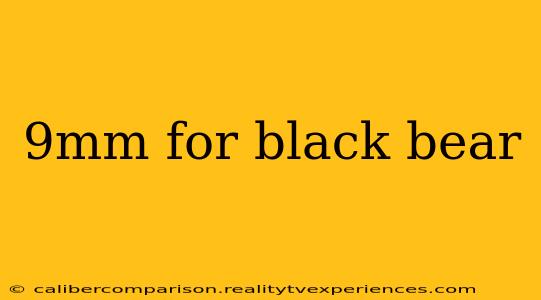The question of whether a 9mm is sufficient for black bear defense is complex and sparks passionate debate among hunters, outdoorspeople, and self-defense experts. There's no single definitive answer, as effectiveness depends heavily on shot placement, ammunition selection, and the specific circumstances of the encounter. This article delves into the realities of using a 9mm against a black bear, weighing the pros and cons to help you make an informed decision.
Understanding the Challenges: Black Bear Physiology and Behavior
Before discussing firearm suitability, it's crucial to understand the challenges posed by black bears. These animals are powerful and possess a formidable bite force. Their thick hides and musculature mean that less powerful rounds might not penetrate deeply enough to cause incapacitation. Furthermore, black bears can be incredibly unpredictable, sometimes exhibiting aggressive behavior without warning.
The 9mm's Limitations and Advantages
The 9mm pistol, while a popular and reliable sidearm, presents some limitations when it comes to bear defense. Its relatively smaller caliber and lower energy compared to larger cartridges like .44 Magnum or .454 Casull mean it relies heavily on precise shot placement to be effective. A poorly placed shot, even with expanding ammunition, might not stop a charging bear.
However, the 9mm possesses some advantages:
- High Capacity: Many 9mm handguns offer higher magazine capacities than larger caliber revolvers or pistols. This is crucial in a potentially prolonged confrontation.
- Easier to Carry and Maneuver: The lighter weight and more manageable recoil of a 9mm make it easier to carry for extended periods and to maintain control during a stressful encounter.
- Wide Ammunition Availability: 9mm ammunition is readily available and relatively affordable compared to some larger calibers.
Ammunition Selection: Critical for Effectiveness
The choice of ammunition is paramount when considering a 9mm for bear defense. Standard full metal jacket (FMJ) rounds are generally not recommended due to their limited expansion and penetration characteristics. Instead, focus on ammunition specifically designed for self-defense and bear protection. Look for rounds with:
- High Penetration: The bullet needs to penetrate the bear's thick hide and reach vital organs.
- Controlled Expansion: Expanding bullets transfer more energy to the target, increasing the likelihood of incapacitation.
- Hard Cast Bullets: These are a popular option for increased penetration but with less expansion compared to jacketed hollow points.
Note: Always test your chosen ammunition in your specific firearm to ensure reliable functioning and accurate performance.
Shot Placement: The Decisive Factor
Regardless of caliber, accurate shot placement is the most crucial factor in any self-defense scenario, especially against a large animal like a black bear. Aiming for the head or chest offers the best chance of causing incapacitation. However, in a stressful encounter, accurate shots can be difficult to achieve, highlighting the importance of training and practice.
Alternative Options: When a 9mm Might Not Be Enough
While a 9mm can be used, many experts recommend larger caliber handguns or shotguns for black bear defense due to their superior stopping power. Shotguns, particularly with slugs or buckshot, offer devastating power at close range. Larger caliber revolvers or semi-automatic pistols also offer a significant advantage in stopping power.
Conclusion: Informed Decision Making
Using a 9mm for black bear defense is a calculated risk. While it's possible to successfully defend oneself with a 9mm under the right circumstances (accurate shot placement, suitable ammunition, etc.), it's not the ideal choice compared to larger calibers. Consider your experience level, the specific environment, and your comfort level before relying on a 9mm for bear protection. Thorough training, appropriate ammunition selection, and understanding your limitations are crucial for any self-defense scenario involving potentially dangerous wildlife. Always prioritize safety and preparedness.

